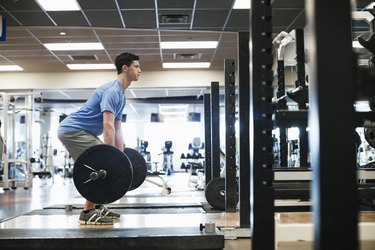
When you think about a workout to get your heart pumping, you probably picture aerobics: running, swimming or maybe cycling. An exhaustive strength training session, however, can also speed up your pulse. Your ideal heart rate while lifting weights will depend on your fitness level and your goals.
Warning
Remember to consult a physician before beginning any new exercise program.
Video of the Day
Heart Rate While Lifting Weights
The ideal heart rate for aerobic exercises is considered to be somewhere between 50 and 80 percent of your maximal heart rate. Calculate the maximal rate by subtracting your age from 220. For a 40-year-old man, this means a maximal heart rate of 180 beats per minute (BPM), and a target heart rate of between 90 and 144 BPM.
Video of the Day
Read more: Heart Rate, Exercise & Age
When your heart rate goes above 50 percent of your maximal rate, you know that you are doing aerobic exercise. Aerobic exercise is great for the heart, recommended as a daily activity by the National Institutes of Health. Classic strength training is made up of slow repetitions of steady strength movements with plenty of recovery time between sets, usually two or three times per week.
The popular combination of these two worlds of fitness is commonly known as HIIT — high-intensity interval training. This practice can involve traditional strength exercises, traditional aerobic exercises or a combination of the two, just faster and harder than normal.
The more intense the training on your heart and your muscles, the shorter your workout should be, which is why Harvard Health says that you can cut your recommended weekly exercise time in half choosing HIIT over moderate aerobic exercise. If you are just beginning an exercise routine, or have been diagnosed with a heart condition, start slow developing a new workout. Consult a doctor before you begin.
Heart Rate After Exercise
The authors of a paper published in the February 2016 issue of the Journal of Applied Physiology write: "Recovery of the cardiovascular system following exercise is not simply a return to pre-exercise; rather, it is a dynamic period in which many physiological changes occur. Although exercise is a critical stress that drives the beneficial cardiovascular adaptations associated with routine physical activity, it is during the recovery period in which these adaptations take place."
If your heart beats fast when lifting weights, there are some things you can do to help your body recover. First, if your heart rate after exercise or at any time during your workout exceeds 80 percent of your maximal rate and will not slow down on its own, consult a doctor right away.
Conditions like supraventricular tachycardia can be dangerous without treatment. A normal resting heart rate is between 60 and 100 BPM. After you finish exercising, your heart should slowly begin to return to this resting rate, but it may take some time, especially if you have taken any kind of workout supplements containing caffeine.
Heart rate recovery is an important biomarker for overall cardiovascular health, researchers reported in a June 2016 paper in Circulation Research. Poor recovery is closely linked to smoking tobacco, according to an April 2017 study in the Journals of Gerontology, so quitting may help you recover faster.
What Is Heart Rate Variability?
Heart rate variability, as defined in a January 2015 paper in Global Advances in Health and Medicine, is a measure of how quickly and effectively the heart responds to changes in the environment and in the rest of the body.
Someone with high heart rate variability has a nervous system capable of intricately manipulating heart rate in response to small changes in the sympathetic or parasympathetic nervous system. Your heart rate while lifting weights increases slowly, and recovers quickly during rest.
Read more: Why Does Our Heart Rate Increase During Exercise?
Low heart rate variability means the body is less responsive to cues from the nervous system. A February 2018 literature review in Psychiatry Investigation found this particular measurement to be a useful tool for measuring psychological health, as evidence suggests that chronic stress may impair the sympathetic and parasympathetic nervous system's ability to control heart rate. Your workout is important, but relaxing afterward is, too!
- National Institutes of Health: "Your Guide to Physical Activity and Your Heart"
- Harvard Health: "Interval Training for a Stronger Heart"
- Harvard Health: "Ask the Doctor: Are Isometric Exercises Safe for the Heart?"
- Journal of Applied Psychology: "The Cardiovascular System After Exercise"
- Harvard Health: "Putting the Brakes on a Racing Heart"
- Circulation Research: "Speed of Heart Rate Recovery in Response to Orthostatic Challenge"
- The Journals of Gerontology: "What Explains Socioeconomic Differences in the Speed of Heart Rate Recovery to Postural Challenge?"
- Global Advances in Health and Medicine: "Heart Rate Variability: New Perspectives on Physiological Mechanisms, Assessment of Self-regulatory Capacity, and Health Risk"
- Psychiatry Investigation: "Heart Rate Variability: New Perspectives on Physiological Mechanisms, Assessment of Self-regulatory Capacity, and Health Risk"
Was this article helpful?
150 Characters Max
0/150
Thank you for sharing!
Thank you for your feedback!